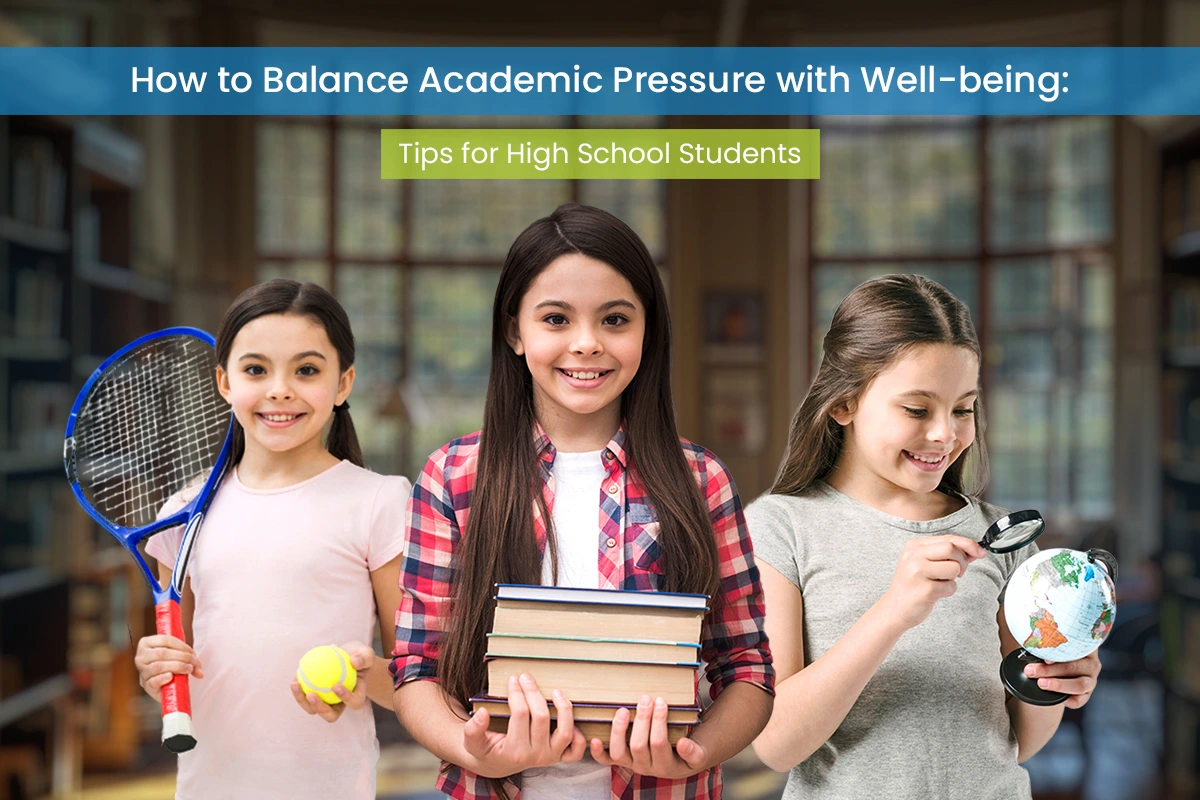Balancing academic pressure with personal well-being is a critical challenge for high school students. There are numerous benefits of participating in extracurricular activities, which can help alleviate academic pressure and promote a healthy lifestyle. By adopting practical strategies, students can navigate these demands effectively, ensuring both academic success and overall well-being.
1. What Is Academic Pressure and Why Does It Matter?
Academic pressure refers to the stress and expectations placed on students to perform well in school. This can come from parents, teachers, peers, or even self-imposed standards. While some level of pressure can drive motivation, excessive demands often lead to anxiety, poor performance, and compromised well-being.
Handling such pressure effectively is key to maintaining balance. Implementing strategies for coping with academic stress can significantly improve students’ ability to perform under pressure. Exploring tools that address school stress management early on is crucial for maintaining mental and physical health.
2. The Connection Between Well-being and Academic Success
A healthy mind and body are essential for excelling in academics. Students who prioritize well-being often find it easier to concentrate, retain information, and manage their time effectively. Activities like regular exercise, balanced nutrition, and mindfulness practices can significantly enhance both physical and mental health.

For example, incorporating relaxation techniques such as deep breathing or yoga into daily routines is a practical approach to stress management for students. Research shows that students who focus on mental health for academic success are better equipped to handle challenges. Learn more about the impact of well-being on academic achievement.
3. Mastering Time Management for Students
Effective time management is essential for achieving a balance between academic responsibilities and personal life. Without a structured plan, students may feel overwhelmed and struggle to meet deadlines. Here are some practical tips:
- Plan ahead: Use a planner or digital calendar to map out assignments, tests, and activities.
- Prioritize tasks: Focus on high-priority assignments first to alleviate stress and avoid last-minute cramming.
- Break it down: Divide larger tasks into smaller, manageable steps to maintain focus and productivity.
- Avoid distractions: Designate specific times for studying and minimize interruptions by turning off notifications.
These practices can help students create a schedule that balances academics and relaxation. Learn how to enhance your time management skills for greater success.
4. Proven Techniques for Stress Management for Students
Stress is an inevitable part of a student’s life, but managing it effectively can prevent it from becoming overwhelming. Techniques for handling stress include:
Engage in regular physical activity: Engaging in workouts stimulates the release of endorphins, enhancing mood and alleviating stress. Engaging in activities such as jogging, swimming, or taking a brisk walk can have a significant impact.
Practice mindfulness: Meditation and breathing exercises help students stay grounded and focused, especially during challenging times.
Connect with others: Sharing concerns with friends, family, or mentors can provide emotional support and valuable perspectives.
Incorporating these practices helps students cope with
5. The Role of Building Resilience in Students
Resilience is the ability to adapt and bounce back from challenges, a skill that is particularly valuable for students facing academic pressure. Here’s how resilience can be cultivated:
Focus on growth: View mistakes and setbacks as opportunities to learn and improve.
Set realistic goals: Achievable goals build confidence and reduce the risk of feeling overwhelmed.
Practice self-reflection: Regularly evaluate strengths and weaknesses to understand personal progress.
Building resilience equips students to navigate obstacles with a positive mindset. Learn how resilience in education can empower students to overcome academic challenges effectively.
6. Developing and Sustaining Healthy Study Habits
Adopting effective study habits is essential for students aiming to succeed academically without succumbing to burnout. Here are some key practices:
- Establish a routine: Set consistent times for studying to create a structured daily schedule.
- Optimize your study space: A tidy, quiet, and systematically arranged space fosters concentration and efficiency.
- Use active learning techniques: Engage with material through summarization, discussions, or teaching concepts to peers.
- Take breaks: Regular intervals during study sessions help maintain concentration and prevent fatigue.
These habits foster a sustainable approach to learning, reducing the stress associated with academic demands. Find out more about study habits that lead to academic success.
7. Recognizing and Addressing Academic Burnout
Academic burnout can manifest as persistent exhaustion, reduced motivation, and declining performance. Common signs include:
- Difficulty concentrating on tasks
- Constant fatigue despite adequate rest
- Physical symptoms such as headaches or insomnia
Addressing burnout requires proactive measures like practicing stress management for students, taking breaks, and seeking help when needed. Recognizing the symptoms of burnout at an early stage facilitates prompt intervention. Discover ways to recover from academic burnout and restore balance.
8. Seeking Support: How to Ask for Help
It is essential for students to understand that asking for help is not a sign of weakness; instead, it reflects their strength and resilience. Here’s where to seek support:
- School counsellors: Trained professionals who can provide strategies for managing stress and improving academic performance.
- Teachers: They can offer insights, additional resources, or extensions when workloads become unmanageable.
- Peer groups: Collaborating with classmates on challenging assignments or group studies often lightens the burden.
Leveraging these resources can significantly alleviate the weight of academic pressure, enabling students to perform better in all areas. Learn more about how to seek support effectively in school.
9. Striking a Balance Between Academics and Personal Life
Maintaining an equilibrium between schoolwork and personal life is vital for long-term success and happiness. Here are some strategies:
- Pursue hobbies: Dedicate time to activities you love, such as painting, playing an instrument, or engaging in sports.
- Spend quality time with loved ones: Building meaningful relationships provides emotional stability and stress relief.
- Celebrate small wins: Acknowledge achievements—no matter how minor—to maintain motivation.
Achieving balance ensures students remain energized and focused, ready to tackle future challenges with confidence.
Balancing academic pressure with well-being is a journey of self-discovery and growth. By embracing these strategies, students can create a fulfilling high school experience that prioritizes both their academic aspirations and personal happiness. Success is not just measured by grades but by the ability to thrive in all areas of life.









